Month: October 2016
-

This Week On The Academic Minute (2016.10.24)
This Week on The Academic Minute 2016.10.24 Monday, October 24th Corey Seemiller of Wright State University explores if young voters will decide this year’s election. Tuesday, October 25th Jack Rakove of Stanford University discusses the beginnings of the Electoral College. Wednesday, October 26th Amy Bree Becker of Loyola University Maryland examines political comedy. Thursday, October…
-

The Academic Minute for 2016.10.17-10.21
Academic Minute from 10.17 – 10.21 Monday, October 17th Matthew Feinberg – University of Toronto Persuading Political Opponents Matthew Feinberg is an Assistant Professor of Organizational Behaviour at Rotman. He earned his PhD in Social Psychology from the University of California, Berkeley. His research explores the underlying psychological processes that lead individuals to join together…
-
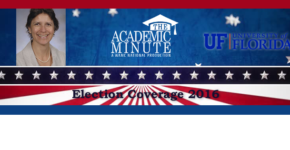
Victoria Pagan, University of Florida – Conspiracy Theories
Could modern conspiracy theories be traced back to ancient Rome? Victoria Pagan, professor of classics at University of Florida, delves into whether ancient examples can relate to present day theories. Professor of Classics at the University of Florida, Victoria Emma Pagán is a University of Florida Research Foundation Professor for 2014-2016 and a recipient of…
-

Mary Steffel featured on The Best of Our Knowledge
As always, host Bob Barrett selects an Academic Minute to air during The Best of Our Knowledge. Each week this program examines some of the issues unique to college campuses, looks at the latest research, and invites commentary from experts and administrators from all levels of education. For this week‘s edition (#1361), Bob has selected…
-
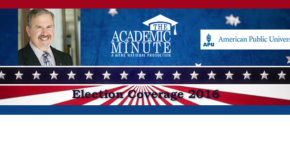
Stephen Schwalbe, American Public University – Should The Electoral College Be Abolished?
Should the Electoral College be abolished? Stephen Schwalbe, Program Director of Political Science at American Public University, details why that might not be the best course of action. Dr. Schwalbe, Program Director of Political Science at American Public University, retired from the Air Force in 2007 as a colonel after 30 years of active duty…
-
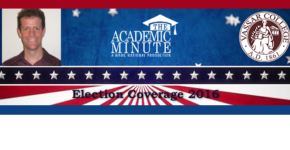
Curtis Dozier, Vassar College – Political Rhetoric
What do Aristotle and sound bites have in common? Curtis Dozier, visiting assistant professor of Greek & Roman studies at Vassar College, examines whether candidates use Aristotle’s teachings when appealing to voters. Curtis Dozier received his Ph.D. from the University of California, Berkeley in 2008 and specializes in Latin poetry, classical rhetoric, and ancient literary…
-
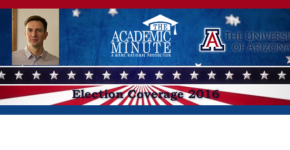
Scott Selisker, University of Arizona – Brainwashing
Are we being brainwashed? Scott Selisker, assistant professor of English at the University of Arizona, examines if we are as free thinking as we think we are. Scott Selisker teaches at the University of Arizona, and he has also taught at Macalester College, the University of California, Santa Barbara (as an ACLS New Faculty Fellow)…
-
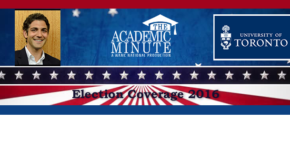
Matthew Feinberg, University of Toronto – Persuading Political Opponents
If you want someone to switch political sides, try their perspective. Matthew Feinberg, Assistant Professor of Organizational Behaviour at the University of Toronto’s Rotman School of Management, explores why people tend to stick to their own side in a heated debate. Matthew Feinberg is an Assistant Professor of Organizational Behaviour at Rotman. He earned his…
-

This Week On The Academic Minute (2016.10.17)
This Week on The Academic Minute 2016.10.17 Monday, October 17th Matthew Feinberg of the University of Toronto explores why its hard to persuade your political opponents to take your viewpoint. Tuesday, October 18th Scott Selisker of the University of Arizona discusses brainwashing in the past and present. Wednesday, October 19th Curtis Dozier of Vassar College details…
-

The Academic Minute for 2016.10.10-10.14
Academic Minute from 10.10 – 10.14 Monday, October 10th Natasha Rajah – McGill University Middle-Aged Memory Decline Natasha Rajah received her PhD at the University of Toronto and received her postdoctoral training at the University Berkeley. She began working at the Douglas Institute in 2005 as assistant professor in the Department of Psychiatry. In 2007, she…
